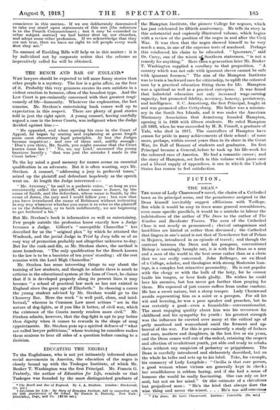'11LE, BENCH AND BAR OF ENGLAND.* WHY lawyers should be
expected to tell more funny stories than other people is a mystery. The law is a grim affair, on the face of it. Probably this very grimness creates its own antidote in a violent reaction to humour, often of the broadest type. And the Law Court is pre-eminently concerned with that greatest tragicomedy of life—humanity. Whatever the explanation, the fact remains. Mr. Strahan's entertaining book comes well up to expectation in this respect. There are plenty of good stories told in just the right spirit. A young counsel, having carefully argued a case in the lower Courts, was indignant when the Judge decided against him :— " He appealed, and when opening his case in the Court of Appeal, he began by stating and explaining at great length some most elementary legal principles. At last the Judges became impatient ; and one of them said, mildly enough : 'Don't you think, Mr. Smith, you might assume that the Court knows some law ? " No, no, my Lord,' answered the young barrister hastily ; 'that was just the mistake I made in the Court below."
To the lay mind a good memory for names seems an essential qualification in an advocate. But it is often wanting, says Mr. Strahan. A counsel, "addressing a jury in perfervid tones," mixed up the plaintiff and defendant hopelessly as the speech went on. At length the Judge intervened :— "Mr Attorney," he said in a pathetic voice, "so long as you consistently called the plaintiff, whose name is Jones, by the name of Smith, and the defendant, whose name is Smith, by the name of Jones, the jury and I could follow you : but now that you have introduced the name of Robinson without indicating in any way whatever whether you mean it to refer to the plaintiff or to the defendant, or to both indifferently, we are beginning to get bothered a bit."
But Mr. Strahan's book is informative as well as entertaining. Few people outside the profession know exactly how a Judge becomes a Judge. Gilbert's "susceptible Chancellor" has described for us the "original plan" by which he attained the Woolsack, and the jovial Judge in Trial by Jury tells us of an easy way of promotion probably not altogether unknown to-day. But for the rank-and-file, as Mr. Strahan shows, the method is more humdrum. "The only qualification for the Bench known to the law is to be a barrister of ten years' standing : all the rest remains with the Lord High Chancellor."
Mr. Strahan has some interesting things to say about the training of law students, and though he admits there is much to criticize in the educational system at the Inns of Court, he claims that if it is developed properly along its present lines it may become "a school of practical law such as has not existed in England since the great age of Elizabeth." In choosing a career the young student advised by Mr. Straiten would go to the Chancery Bar. Here the work "is well paid, clean, and intellectual," whereas in Common Law most actions "are in the nature of dog-fights, or if you like it better, of civil war, which the existence of the Courts merely renders more civil." Mr. Strahan admits, however, that the dog-fight is apt to pay better than dignity when it comes to rewards in the shape of snug appointments. Mr. Strahan puts up a spirited defence of "what are called lawyer politicians," whose training he considers makes them anxious to hear all sides of a question before coming to a decision.


































 Previous page
Previous page